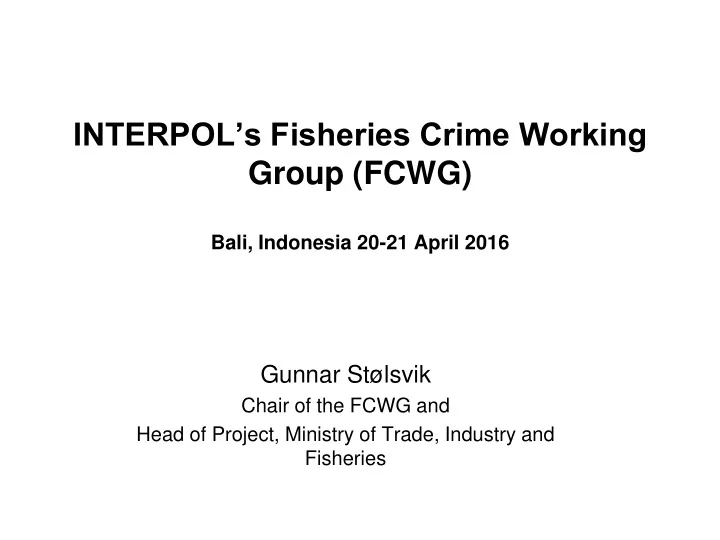

INTERPOL’s Fisheries Crime Working Group (FCWG) Bali, Indonesia 20-21 April 2016 Gunnar Stølsvik Chair of the FCWG and Head of Project, Ministry of Trade, Industry and Fisheries
INTERPOL Fisheries Crime Working Group
What is fisheries crime? • It is a term of criminology. • Covers all crimes along the value chain • Includes penal provisions in a whole range of relevant legislation through the value chain. • Indonesia describes it as the "multi door approach". Every door leads to the main problem which is transnational organized fisheries crime. Illegal fishing, human trafficking, money laundering, customs- and tax crime, document fraud, pollution etc.
Joint statement by the the Norwegian and Indonesian fisheries minister (25.11.2015) FAO UNO DC
The meeting of experts on transnational organized crime committed at sea held in Vienna on 5-6 April 2016 • 12. Work in relation to the criminal justice and crime prevention aspects of transnational organized fisheries crime must continue, given the significance of fisheries for development in many States . Aspects of fisheries crime, on a case by case basis and depending on the relevant national legislation, can represent TOC committed at sea. Cooperation and capacity building through criminal justice and crime prevention organisations – such as UNODC and INTERPOL – is important to effectively combatting transnational organized fisheries crime.
• 13. There is a clear need for transnational organized fisheries crime capacity building in Africa, Asia, and Central America. Experts from a number of Asian, African, and Central American States addressed the particular need for technical assistance from UNODC and INTERPOL in relation to building capacities, and the regulatory framework, for combatting transnational organized fisheries crime. Some developing States are seeking – and require - assistance to deal with transnational organized fisheries crime in terms of the full criminal value chain, including document fraud, money laundering, human trafficking and labor exploitation, corruption, tax and customs fraud, and other related crimes.
How can INTERPOL help? • Secure global communication network; • 24/7 support to policing and law enforcement; • Capacity building; • Assisting member countries in the identification of crimes and criminals. • 190 member States
INTERPOL Fisheries Crime working group The mandate of the Working Group shall be to assist the General Secretariat in policy formulation and project implementation as subject matter experts regarding the prevention, deterrence and suppression of fisheries and related crime.
The main focus is fisheries crime including crimes against living marine resources. In addition the Fisheries Crime Working Group may explore links to related crimes such as crossover crimes (e.g. human trafficking, tax and customs fraud, traffic in illegal drugs and psychotropic substances, corruption and money laundering).
The 1st INTERPOL fisheries enforcement conference
Strategic work • The FCWG meeting in Cape Town 2015 recognized the need for greater political support to the work of INTERPOL and the FCWG.
Challenge ahead • How to transform lessons learned from Interpol operations into change? • Practical issues • Legislative issues • International law issues • Policy issues
Recommend
More recommend